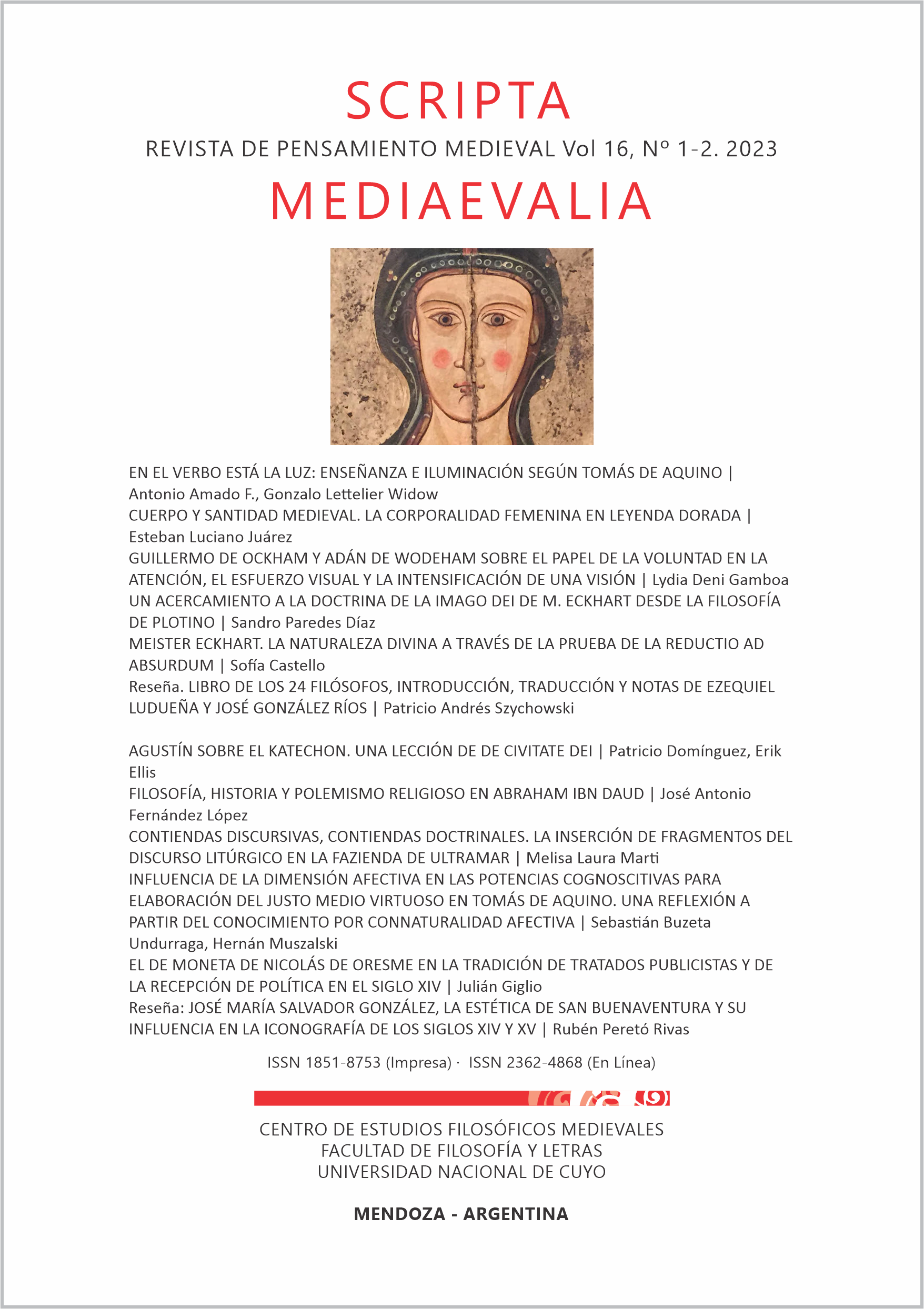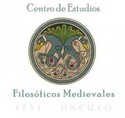Guillermo de Ockham y Adán de Wodeham sobre el papel de la voluntad en la atención, el esfuerzo visual y la intensificación de una visión
DOI:
https://doi.org/10.48162/rev.35.025Palabras clave:
Guillermo de Ockham, Adán de Wodeham, contenidos perceptuales, pasividad del intelectoResumen
William of Ockham y Adam of Wodeham sostuvieron diferentes teorías para explicar cómo los contenidos perceptuales cambian y se adaptan a los cambios sufridos por los objetos percibidos. Los cambios de estos contenidos ocurren cuando hay (1) atención, (2) un esfuerzo visual o (3) la intensificación de una visión. La teoría de Ockham sobre este tema involucra la idea según la cual el intelecto es pasivo, pero puede actuar con la ayuda de la voluntad. La teoría de Ockham conduce a un problema, al cual llamo el problema del bucle, pues según él la voluntad solo puede querer aquello que el intelecto ya conoce. Wodeham parece que detecta este problema y, por tal razón, se separa de la teoría de Ockham sobre el cambio de los contenidos perceptuales. La teoría de Wodeham no involucra a la voluntad. Para Wodeham, el intelecto parece ser pasivo y el cambio de un contenido perceptual depende solamente de la variabilidad del campo perceptual.
Citas
Brower-Toland, Susan. “Intuition, Externalism, and Direct Reference in Ockham.” History of Philosophy Quarterly 24, no. 4 (2007): 317–36.
Brower-Toland, Susan. “Medieval Approaches to Consciousness: Ockham and Chatton.” Philosophers Imprint 12 (2012): 1–29.
Brower-Toland, Susan. “William Ockham on the Scope and Limits of Consciousness.” Vivarium 52, no. 3–4 (2014): 197–219.
Brown, Deborah . “Augustine and Descartes on the Function of Attention in Perceptual Awareness.” In Consciousness from Perception to Reflection in the History of Philosophy, edited by Heinämaa, Sara, Lähteenmäki, Vili, and Remes, Pauliina, 153–75. Dordrecht, Netherlands: Springer, 2007.
Gamboa, Lydia Deni. “El Conocimiento Intuitivo Como Garante Epistémico Según William of Ockham y Adam of Wodeham.” Bulletin de Philosophie Médiévale 60 (January 2018): 47–66. https://doi.org/10.1484/J.BPM.5.116903.
Karger, Élizabeth. “Ockham and Wodeham on Divine Deception as a Skeptical Hypothesis.” Vivarium 42, no. 2 (2004): 225–36.
Karger, Élizabeth. “Mental Sentences According to Burley and to the Early Ockham,” Vivarium 34, no. 2 (1996): 192–230.
McCord Adams, Marilyn. William Ockham. Vol. 2. 2 vols. Notre Dame, Ind.: University of Notre Dame Press, 1987.
Ockham, Guillelmi de. OTh I. Scriptum in Librum Primum Sententiarum Ordinatio, Prologus et Distinctio Prima. Edited by Gedeon Gál.
Opera Philosophica et Theologica. St. Bonaventure, N.Y.: Editiones Instituti Franciscani Universitatis S. Bonaventurae, 1967.
Ockham, Guillelmi de. OTh III. Scriptum in Librum Primum Sententiarum Ordinatio, Distinctiones IV-XVIII. Edited by Girardus I. Etzkorn. Opera Philosophica et Theologica. St. Bonaventure, N.Y.: Editiones Instituti Franciscani Universitatis S. Bonaventurae, 1977.
Ockham, Guillelmi de. OTh VII. Quaestiones in Librum Quartum Sententiarum (Reportatio). Edited by Rega Wood and Gedeon Gál. Opera Philosophica et Theologica. St. Bonaventure, N.Y.: Editiones Instituti Franciscani Universitatis S. Bonaventurae, 1984.
Ockham, Guillelmi de. OTh VIII. Quaestiones Variae. Edited by Girardus I. Etzkorn, Franciscus E. Kelley, and Josephus C. Wey C.S.B. Opera Philosophica et Theologica. St. Bonaventure, N.Y.: Editiones Instituti Franciscani Universitatis S. Bonaventurae, 1984.
Ockham, Guillelmus de. OPh I. Summa Logicae. Edited by Philotheus Boehner, Gedeon Gál, and Stephanus Brown. Opera Philosophica et Theologica. St. Bonaventure, N.Y.: Editiones Instituti Franciscani Universitatis S. Bonaventurae, 1974.
Ockham, Guillelmi de. OPh II. Expositio in Librum Perihermenias Aristotelis. Edited by Angelus Gambatese and Stephanus Brown. Opera Philosophica et Theologica. St. Bonaventure, N.Y.: Editiones Instituti Franciscani Universitatis S. Bonaventurae, 1978.
Ockham, Guillelmi de. OPh IV. Expositio in Libros Physicorum Aristotelis, Prologus et Libri I-III. Edited by Vladimirus Richter and Gerhardus Leibold. Opera Philosophica et Theologica. St. Bonaventure, N.Y.: Editiones Instituti Franciscani Universitatis S. Bonaventurae, 1985.
Ockham, Guillelmi de. OPh VI. Brevis Summa Libri Physicorum. Edited by Stephanus Brown. Opera Philosophica et Theologica. St. Bonaventure, N.Y.: Editiones Instituti Franciscani Universitatis S. Bonaventurae, 1986.
Panaccio, Claude. “Intellections and Volitions in Ockham’s Nominalism.” In Emotion and Cognitive Life in Medieval and Early Modern Philosophy, edited by Martin Pickavé and Lisa Shapiro, 75–93. Oxford: Oxford University Press, 2012. Oxford Scholarship Online, 2013. doi: 10.1093/acprof:oso/9780199579914.003.0005.
Panaccio, Claude. “Ockham: Intuition and Knowledge.” In Rational Intuition: Philosophical Roots, Scientific Investigations, edited by Lisa M Osbeck and Barbara S Held, 55–74. New York: Cambridge University Press, 2014.
Panaccio, Claude. Ockham on Concepts. Aldershot, Hants, England; Burlington, VT: Ashgate Pub., 2004.
Panaccio, Claude, and David Piché. “Ockham’s Reliabilism and the Intuition of Non-Existents.” In Rethinking the History of Skepticism, edited by Henrik Lagerlund, 97–118. Leiden; Boston: Brill, 2010.
Pasnau, Robert. Theories of Cognition in the Later Middle Ages. Cambridge, U.K.; New York: Cambridge University Press, 1997.
Silva, José Filipe. “Medieval Theories of Active Perception: An Overview.” In Active Perception in the History of Philosophy: From Plato to Modern Philosophy, edited by José Filipe Silva and Mikko Yrjönsuuri, 117–46. Studies in the History of Philosophy of Mind. Cham: Springer International Publishing, 2014. https://doi.org/10.1007/978-3-319-04361-6_7.
Wood, Rega. “Calculating Grace: The Debate about Latitude of Forms According to Adam de Wodeham.” In Knowledge and the Sciences in Medieval Philosophy, edited by Simo Knuuttila, Reijo Työrinoja, and Sten Ebbesen, 2:373–91. Helsinki: Yliopistopaino, 1990.
Publicado
Cómo citar
Número
Sección
Licencia

Esta obra está bajo una licencia internacional Creative Commons Reconocimiento-NoComercial-CompartirIgual 3.0.






































